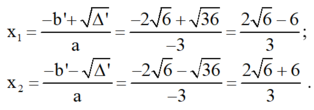CMR:
a) 4x2-x+1>0
b) -3x2+x-1<0
Hãy nhập câu hỏi của bạn vào đây, nếu là tài khoản VIP, bạn sẽ được ưu tiên trả lời.


a) 5 x 2 – x + 2 = 0 ;
a = 5; b = -1; c = 2
Δ = b 2 - 4 a c = ( - 1 ) 2 - 4 . 5 . 2
= 1 - 40 = -39 < 0
Vậy phương trình trên vô nghiệm.
b) 4 x 2 – 4 x + 1 = 0 ;
a = 4; b = -4; c = 1
Δ = b 2 - 4 a c = ( - 4 ) 2 - 4 . 4 . 1 = 16 - 16 = 0
⇒ phương trình có nghiệm kép
x = (-b)/2a = (-(-4))/2.4 = 1/2
Vậy phương trình có nghiệm duy nhất x = 1/2
c) - 3 x 2 + x + 5 = 0
a = -3; b = 1; c = 5
Δ = b 2 - 4 a c = 12 - 4 . ( - 3 ) . 5 = 1 + 60 = 61 > 0
⇒ Do Δ >0 nên áp dụng công thức nghiệm, phương trình có 2 nghiệm phân biệt
x 1 = ( 1 - √ 61 ) / 6 ; x 2 = ( 1 + √ 61 ) / 6

a.
$x^4-25x^3=0$
$\Leftrightarrow x^3(x-25)=0$
\(\Leftrightarrow \left[\begin{matrix} x^3=0\\ x-25=0\end{matrix}\right.\Leftrightarrow \left[\begin{matrix} x=0\\ x=25\end{matrix}\right.\)
b.
$(x-5)^2-(3x-2)^2=0$
$\Leftrightarrow (x-5-3x+2)(x-5+3x-2)=0$
$\Leftrightarrow (-2x-3)(4x-7)=0$
\(\Leftrightarrow \left[\begin{matrix}
-2x-3=0\\
4x-7=0\end{matrix}\right.\Leftrightarrow \left[\begin{matrix}
x=\frac{-3}{2}\\
x=\frac{7}{4}\end{matrix}\right.\)
c.
$x^3-4x^2-9x+36=0$
$\Leftrightarrow x^2(x-4)-9(x-4)=0$
$\Leftrightarrow (x-4)(x^2-9)=0$
$\Leftrightarrow (x-4)(x-3)(x+3)=0$
\(\Leftrightarrow \left[\begin{matrix} x-4=0\\ x-3=0\\ x+3=0\end{matrix}\right.\Leftrightarrow \left[\begin{matrix} x=4\\ x=3\\ x=-3\end{matrix}\right.\)
d. ĐK: $x\neq 0$
$(-x^3+3x^2-4x):(\frac{-1}{2}x)=0$
$\Leftrightarrow x(-x^2+3x-4):(\frac{-1}{2}x)=0$
$\Leftrightarrow -2(-x^2+3x-4)=0$
$\Leftrightarrow x^2-3x+4=0$
$\Leftrightarrow (x-1,5)^2=-1,75< 0$ (vô lý)
Vậy pt vô nghiệm.

a) Phương trình bậc hai 4 x 2 + 4 x + 1 = 0
Có a = 4; b’ = 2; c = 1; Δ ’ = ( b ’ ) 2 – a c = 2 2 – 4 . 1 = 0
Phương trình có nghiệm kép là:

b) Phương trình 13852 x 2 – 14 x + 1 = 0
Có a = 13852; b’ = -7; c = 1;
Δ ’ = ( b ’ ) 2 – a c = ( - 7 ) 2 – 13852 . 1 = - 13803 < 0
Vậy phương trình vô nghiệm.
c) Phương trình bậc hai 5 x 2 – 6 x + 1 = 0
Có: a = 5; b’ = -3; c = 1.; Δ ’ = ( b ’ ) 2 – a c = ( - 3 ) 2 – 5 . 1 = 4 > 0
Phương trình có hai nghiệm phân biệt:

d) Phương trình bậc hai: ![]()

Phương trình có hai nghiệm phân biệt :

Kiến thức áp dụng
Phương trình ax2 + bx + c = 0 (a ≠ 0) có biệt thức Δ = b2 – 4ac.
+ Nếu Δ > 0, phương trình có hai nghiệm phân biệt 
+ Nếu Δ = 0, phương trình có nghiệm kép  ;
;
+ Nếu Δ < 0, phương trình vô nghiệm.

b: 4x^2-20x+25=(x-3)^2
=>(2x-5)^2=(x-3)^2
=>(2x-5)^2-(x-3)^2=0
=>(2x-5-x+3)(2x-5+x-3)=0
=>(3x-8)(x-2)=0
=>x=8/3 hoặc x=2
c: x+x^2-x^3-x^4=0
=>x(x+1)-x^3(x+1)=0
=>(x+1)(x-x^3)=0
=>(x^3-x)(x+1)=0
=>x(x-1)(x+1)^2=0
=>\(x\in\left\{0;1;-1\right\}\)
d: 2x^3+3x^2+2x+3=0
=>x^2(2x+3)+(2x+3)=0
=>(2x+3)(x^2+1)=0
=>2x+3=0
=>x=-3/2
a: =>x^2(5x-7)-3(5x-7)=0
=>(5x-7)(x^2-3)=0
=>\(x\in\left\{\dfrac{7}{5};\sqrt{3};-\sqrt{3}\right\}\)

a. (3x - 1)2 - (x + 3)2 = 0
\(\Leftrightarrow\left(3x-1+x+3\right)\left(3x-1-x-3\right)=0\)
\(\Leftrightarrow\left(4x+2\right)\left(2x-4\right)=0\)
\(\Leftrightarrow4x+2=0\) hoặc \(2x-4=0\)
1. \(4x+2=0\Leftrightarrow4x=-2\Leftrightarrow x=-\dfrac{1}{2}\)
2. \(2x-4=0\Leftrightarrow2x=4\Leftrightarrow x=2\)
S=\(\left\{-\dfrac{1}{2};2\right\}\)
b. \(x^3=\dfrac{x}{49}\)
\(\Leftrightarrow49x^3=x\)
\(\Leftrightarrow49x^3-x=0\)
\(\Leftrightarrow x\left(49x^2-1\right)=0\)
\(\Leftrightarrow x\left(7x+1\right)\left(7x-1\right)=0\)
\(\Leftrightarrow x=0\) hoặc \(7x+1=0\) hoặc \(7x-1=0\)
1. x=0
2. \(7x+1=0\Leftrightarrow7x=-1\Leftrightarrow x=-\dfrac{1}{7}\)
3. \(7x-1=0\Leftrightarrow7x=1\Leftrightarrow x=\dfrac{1}{7}\)

a: Ta có: \(40x^4+5x=0\)
\(\Leftrightarrow5x\left(8x^3+1\right)=0\)
\(\Leftrightarrow x\left(2x+1\right)=0\)
\(\Leftrightarrow\left[{}\begin{matrix}x=0\\x=-\dfrac{1}{2}\end{matrix}\right.\)
b: Ta có: \(8x^2-2x-1=0\)
\(\Leftrightarrow8x^2-4x+2x-1=0\)
\(\Leftrightarrow\left(2x-1\right)\left(4x+1\right)=0\)
\(\Leftrightarrow\left[{}\begin{matrix}x=\dfrac{1}{2}\\x=-\dfrac{1}{4}\end{matrix}\right.\)

a) ⇔ \(4x^2+4x-x-1=0\)
⇔ \(4x^2+3x-1=0\)
⇔ \(4x(x+1)-(x+1)=0\)
⇔ \((x+1)(4x-1)=0\)
⇒ \(\left[{}\begin{matrix}x=-1\\x=\dfrac{1}{4}\end{matrix}\right.\)
Vậy...
b) \(x^3-4x^2+4x=0\)
⇔ \(x^2(x-2)-2x(x-2)=0\)
⇔ \((x-2)(x^2-2x)=0\)
⇒ \(\left[{}\begin{matrix}x=2\\x=0\end{matrix}\right.\)
Vậy...
c) \(x^2-3x+2=0\)
⇔ \(x(x-2)-(x-2)=0\)
⇔ \((x-1)(x-2)=0\)
⇒ \(\left[{}\begin{matrix}x=1\\x=2\end{matrix}\right.\)
Vậy...

\(a,\Leftrightarrow x\left(2x-7\right)+2\left(2x-7\right)=0\\ \Leftrightarrow\left(x+2\right)\left(2x-7\right)=0\Leftrightarrow\left[{}\begin{matrix}x=-2\\x=\dfrac{7}{2}\end{matrix}\right.\\ b,\Leftrightarrow x\left(x^2-9\right)=0\\ \Leftrightarrow x\left(x-3\right)\left(x+3\right)=0\Leftrightarrow\left[{}\begin{matrix}x=0\\x=3\\x=-3\end{matrix}\right.\\ c,\Leftrightarrow\left(2x-1\right)\left(2x+1\right)-2\left(2x-1\right)^2=0\\ \Leftrightarrow\left(2x-1\right)\left(2x+1-4x+2\right)=0\\ \Leftrightarrow\left(2x-1\right)\left(-2x+3\right)=0\Leftrightarrow\left[{}\begin{matrix}x=\dfrac{1}{2}\\x=\dfrac{3}{2}\end{matrix}\right.\\ d,\Leftrightarrow x^2\left(x-1\right)-4\left(x-1\right)^2=0\\ \Leftrightarrow\left(x-1\right)\left(x^2-4x+4\right)=0\\ \Leftrightarrow\left(x-1\right)\left(x-2\right)^2=0\Leftrightarrow\left[{}\begin{matrix}x=1\\x=2\end{matrix}\right.\)

\(a,\Leftrightarrow3x\left(x+2\right)=0\Leftrightarrow\left[{}\begin{matrix}x=0\\x=-2\end{matrix}\right.\\ b,\Leftrightarrow x\left(x-1\right)+2\left(x-1\right)=0\\ \Leftrightarrow\left(x-1\right)\left(x+2\right)=0\Leftrightarrow\left[{}\begin{matrix}x=1\\x=-2\end{matrix}\right.\)
a,4x2- x + 1 = (2x)2 - 2.2x.0,25 + 0,0625 + 0,975 = (2x - 0.25)2 + 0,975 > 0
b, -( 3x2 - x + 1) rồi chứng minh tương tự
b) \(-3x^2+x-1=-\left(3x^2-x+1\right)\)
\(=-\left[\left(\sqrt{3}x\right)^2-2.\sqrt{3}x.\frac{1}{2\sqrt{3}}+\frac{1}{12}+\frac{11}{12}\right]\)
\(=-\left[\left(\sqrt{3}x-\frac{1}{2\sqrt{3}}\right)^2+\frac{11}{12}\right]\)
\(=-\left(\sqrt{3}x-\frac{1}{2\sqrt{3}}\right)^2-\frac{11}{12}< 0\left(đpcm\right)\)